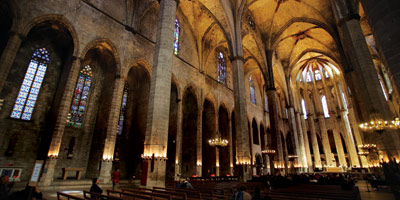Losing Faith
Has Europe abandoned its Christian roots?

Forgotten faith? Will Brunelleschi’s dome of the Duomo in Florence, Italy, represent a religion of the past? Some think so.
“What is happening in Europe today is a crisis of culture; a crisis of civilizational morale; a crisis of faith in the goodness of the European past; and a crisis of confidence in the possibility of a good future.”
— George Weigel, at the SPU President’s Symposium on Knowing and Our World
In 2004, as the 25 countries of the European Union prepared to approve a new European Constitution Treaty, one contentious debate focused on the language of its prologue. Should the document refer explicitly to Christianity as a source of contemporary Europe’s democratic principles and commitments? Christians such as Pope John Paul II called for such language, but those who drafted the treaty finally chose to note only “the cultural, religious, and humanist inheritance of Europe.”
For George Weigel, senior fellow at the Ethics and Public Policy Center in Washington, D.C., and author of The Cube and the Cathedral: Europe, America, and Politics Without God (Basic Books, 2005), the debate spotlighted what he sees as Europe’s long-term, systematic disengagement from its Christian roots. “This not only seemed to me an act of
infidelity toward the past, it seemed to imply a program for the future, namely, state-enforced secularism,” said Weigel, speaking at the Seattle Pacific University President’s Symposium on “Knowing and Understanding Our World: A Christian Response to the 21st Century” in February 2007.
A leading American voice on religious freedom, just-war tradition, Roman Catholic theology, and the future of Europe, Weigel is known for public commentary that is thoughtful, astute — and often controversial. He serves as an NBC News consultant on Vatican affairs, and his nearly 20 books include the acclaimed Witness to Hope: The Biography of Pope John Paul II and The Final Revolution: The Resistance Church and the Collapse of Communism.
Weigel traces Europe’s secularization, in part, to the phenomenon of 19th-century atheistic humanism, “a body of thought which taught that liberation from the God of the Bible was the necessary precondition to human maturity, human authenticity, and human freedom.” The majority of Europeans, he argues, have concluded that Christianity is a threat to — rather than a source of — freedom and democratic ideals.
He contrasts this view with that of other European thinkers, such as the late Pope John Paul II and the Czech Republic’s Vaclav Havel, who rejected the notion that the most important forces of history are political and economic. They believed instead, writes Weigel in The Cube and the Cathedral, that “history is driven, over the long haul, by culture — by what men and women honor, cherish, and worship; by what societies deem to be true and good and noble; by the expressions they give to those convictions in language, literature, and the arts; by what individuals and societies are willing to stake their lives on.”
While at Seattle Pacific, Weigel addressed six different audiences on subjects as far-ranging as Christian engagement in the world and radical Jihadism. He also sat down with SPU Professor of Geography Kathleen Braden to talk about his views, including his analysis of Europe’s loss of faith — and its implications for the United States.
— by Jennifer Johnson Gilnett [response@spu.edu]
— Photo by Oriol Alamany & Eulalia Vicens / Corbis
A Conversation With George Weigel
More Conversation With George Weigel: Online Exclusive
Back to the top
Back to Features Home
|